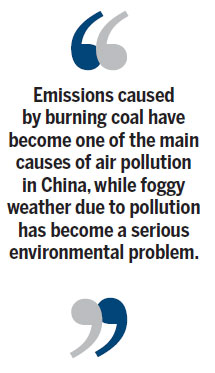China should transform into a green country
Updated: 2013-10-18 08:54
By Wu Zongxin (China Daily Europe)
|
|||||||||||
Reliance on coal has to end if nation is to eliminate pollution
Rising energy consumption during the next few years will prompt China to tread the low-carbon, green energy path sooner than expected.
Last year, total energy consumption in China reached 3.62 billion tons of standard coal, accounting for 20 percent of the world's total. China's energy consumption per capita was about 2.64 tons of standard coal last year, which was slightly above 2.5 tons, the average world energy consumption per capita.
There is no doubt that China will be one of the biggest energy consumers in the future. The country's urbanization rate was about 50 percent last year, while figures for most developed countries were above 80 percent. The experience of developed countries shows that each of them has gone through a period of rapid growth in energy consumption.
Along with the buildup of China's infrastructure in transport, industries and urban design, additional inputs of steel, cement and non-ferrous metals will all lead to more energy consumption.
In recent years, energy consumption in China has increased by 200 million tons of standard coal each year. By 2020, the annual consumption will increase to 5 billion tons of standard coal, and by the end of 2030, it will reach 6 billion tons.

In China the consumption of coal accounts for 70 percent of its total energy consumption, which is higher than the world average of 30 percent. Coal consumption has also created lots of challenges, as China now needs to deal with issues such as reducing pollution, increasing energy efficiency and haulling climate change.
Emissions caused by burning coal have become one of the main causes of air pollution in China, while foggy weather due to pollution has become a serious environmental problem.
With climate change becoming a serious issue worldwide, China should focus more on reducing carbon dioxide emissions. Carbon dioxide emissions in China are 30 percent higher than in any other nation and account for a quarter of all such emissions in the world. With more than half of the annual global carbon emission growth coming from China, it is unlikely that the government will turn a deaf ear to international pleas to reduce such emissions.
Because China's energy consumption is huge, it is unlikely that a single energy source can cater to its needs. Rather than rely on a single energy source, it should have a strategy of using diversified clean energy resources, such as nuclear power, hydroelectric power, renewable energy sources and natural gas.
Nuclear power plays a very important role in China's low-carbon green energy system.
Other alternate energy sources such as wind and solar energy have also started to play important roles. But many shortcomings, such as short-time usage and low production rate, prevent them from competing with other energy resources. Although wind energy has shown fast development in recent years, the percentage of wind energy in the overall energy consumption is only 2 percent globally.
Nuclear energy, on the other hand, has been recognized as a potential source of clean energy by many countries. Nuclear energy plants do not produce carbon dioxide and thus help in the overall reduction of carbon emissions. Nuclear power accounts for 16 percent of the generated energy worldwide, whereas in China it accounts for just 2 percent.
Last year, the Chinese government drew up plans for the development of nuclear energy in the medium and long term. It said that by 2020 China will build nuclear energy generators that will be able to generate 58 million kilowatts of energy, while nuclear energy will account for 5.5 percent of the country's generated energy.
At the same time, safety needs to be given top priority in developing nuclear energy. The Fukushima disaster is a lesson for all nations.
Although there are no reports on the health of human beings being harmed by the radiation of nuclear energy in Fukushima, about 50,000 people were forced to leave their homes for the renovation of the environment, and that includes the decontamination of land, as well as preventing radiated water from polluting the seas. The involved clean-up costs are often huge.
In addition, nuclear energy policy has always been a focus of political debate in some countries, and it has reflected public doubts on its usage.
Concrete measures are needed to ensure the safety of nuclear energy, including the management of nuclear waste. Information about nuclear power also needs to be spread among the public to reduce their doubts.
The author is a professor at Tsinghua University.
(China Daily European Weekly 10/18/2013 page8)
Today's Top News
Scientists requested government to plant GM crops
Travelers to Europe bypass attractions of Brussels
Li urges greater effort on reforms
'Constructive ideas' on thorny issues needed
US deal key to nabbing fugitives
JPMorgan, DOJ reaches $13b deal
As China's economy grows, so does reform call
Expanded property tax trials predicted
Hot Topics
Lunar probe , China growth forecasts, Emission rules get tougher, China seen through 'colored lens', International board,
Editor's Picks

|

|

|

|

|

|





